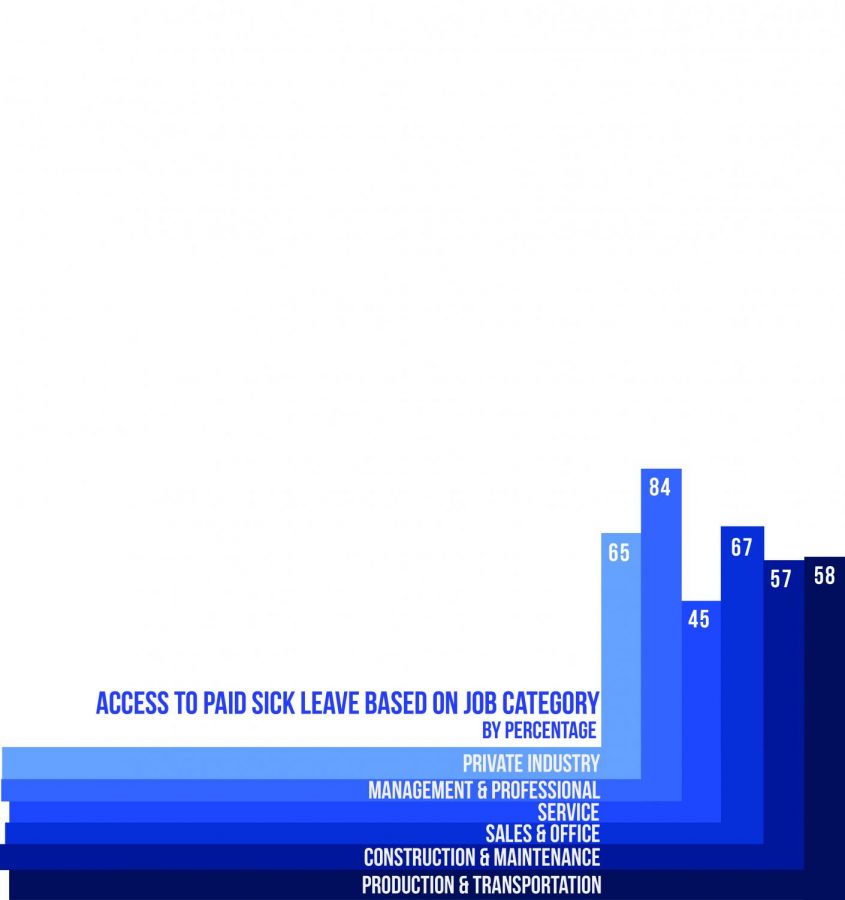Task force prescribes more paid sick days
Working Families Task Force Recommendation graphic
April 11, 2016
The city of Chicago’s Working Families Task Force released its recommendations April 4 for more paid sick leave, paid family and medical leave and considerations of measures that will increase schedule predictability for shift workers.
According to the report, the task force spent six months developing recommendations. Nearly 82 percent of people who voted in a nonbinding referendum held in February 2015 favored paid sick days for workers city-wide.
“[We] want to do what’s right for people in Chicago and make sure this city is paying attention to the needs of its working families,” said Anne Ladky, co-chair of the Working Families Task Force and executive director of Women Employed.
Ladky added that workers need more access to paid sick days so they do not have to choose between their health and employment.
The report recommends that workers earn sick time at one hour for every 40 hours worked, meaning they could earn and use up to five sick days per year.
It also recommends allowing employees to use a portion of their earned paid sick time toward family and medical leave, and according to the report, the measure applies only to companies subject to federal FMLA requirements and eligible employees. Specifically, qualified employees could accrue up to five days of sick leave for FMLA purposes. The report says examples of these reasons would be the birth of a child or the treatment of a serious illness.
As far as schedule predictability for hourly workers, members of the task force said they need to do more research before making a recommendation but want to continue the conversation with employees and employers.
Ladky said the choice for employees is difficult when deciding whether to work or stay home when they are sick.
She said workers have to decide whether to “drag themselves to work” and possibly infect their co-workers or stay at home, unpaid, because they are too sick to work, which, she said, can get employees fired.
“They’re basically choosing between meeting their basic needs and taking care of their health—and some people can lose their jobs for that,” Ladky said.
For Tanisha Johnson, a working mother of three, that choice is one she is forced to make. Johnson works at a nursing home where she is only allowed to miss a limited number of days before she is written up and potentially fired.
“But if my baby is sick, I have no choice but to call off,” Johnson said.
Johnson said it is unfair that she is penalized for taking time off when salaried workers get paid the same amount whether they take sick days or not.
Lakesia Collins, who also works at a nursing home, said she has often gone to work sick because she cannot afford to take days off.
“We can’t afford to lose one day,” Collins said. “It is a hard choice, but it’s something we’ve become immune to.”
As a health care worker, going to work sick is dangerous to her patients, she said.
“We have to choose whether we stay at home and take care of ourselves or go to work and work [miserably] while we’re taking care of somebody else, who we could possibly be putting in danger. Some of our patients have cancer, and they’re already older; their immune [systems are] weaker,” Collins said.
Some organizations, like the Illinois Retail Merchants Association and the Chicagoland Chamber of Commerce, are against the working groups’ report, which they called “skewed,” according to an April 2 press release.
“Businesses are at a tipping point and these proposals will only exacerbate the problems facing employees looking for more hours and higher wages. We cannot provide the jobs, pay the wages and invest in local communities while City Hall layers on one cost after another and chases sales out of the city,” said Rob Karr, president and CEO of Illinois Retail Merchants Association, in the release. “These policies will not result in more jobs being created or higher wages—just the opposite. City Hall needs to remember the overwhelming majority of Chicago’s business owners are working families, too.”
In addition to concerns about affordability, some are worried about what the recommendations mean for the number of jobs available to young people and teens.
“Young people looking for first jobs to gain valuable experience in the workforce are some of the unintended casualties of these types of unaffordable mandates,” said Theresa E. Mintle, president/CEO of the Chicagoland Chamber of Commerce, in the release. “Teen unemployment will absolutely worsen when employers have fewer dollars to budget for salaries.”
The report published by the Working Families Task Force does list concerns raised by the members about the impact of its recommendations on
small businesses.
The report states members were sensitive to the concern of small- and medium-sized businesses and would have liked ranges to be based on the size of employment.
Ladky said there will be arguments about the expense of paid sick days and whether the recommendations are burdens to employers, but the recommendations are inexpensive and need to be implemented.
Ladky said the next steps are to turn the recommendations into an ordinance that could be passed as soon as this spring.
“There’s going to be opposition—there’s no question—but I think people understand that the time has come,” Ladky said. “It’s simply recognizing that there’s an area where working people need some basic protections.”








